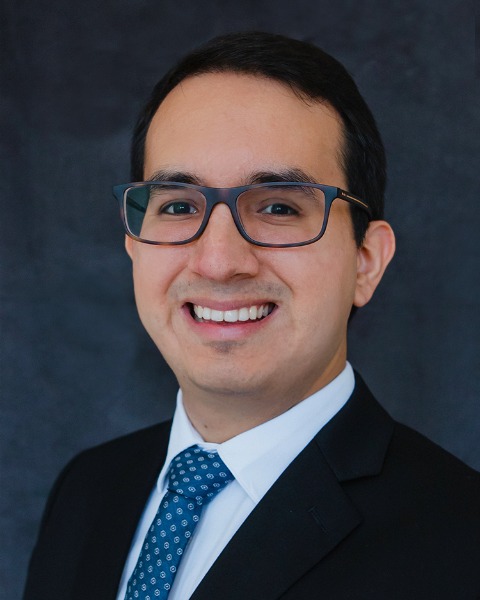End-of-Life Care and Clinical Characteristics of Nonsurvivor Cancer Patients With COVID-19
-

Dereddi Raja Reddy, MD, FACP FCCP
Assistant Professor, Program Director MS4 McGovern Medical School
MD Anderson Cancer Care Center
Houston, TexasDisclosure information not submitted.
-
MM
Mayoora Muthu, DO
Assistant Professor
The University of Texas MD Anderson Cancer Center, United StatesDisclosure information not submitted.
-

John Cuenca, MD (he/him/his)
Clinical Research Assistant
The University of Texas MD Anderson Cancer Center
Houston, TexasDisclosure information not submitted.
-
RW
Robert Wegner, MD, FASA
Assistant Professor
The University of Texas MD Anderson Cancer Center, United StatesDisclosure information not submitted.
-
JC
John Crommett, MD
Associate Professor
The University of Texas MD Anderson Cancer Center, United StatesDisclosure information not submitted.
-

Cristina Gutierrez, MD
Associate Professor of Critical Care Medicine
University of Texas MD Anderson Cancer Center
Houston, TexasDisclosure information not submitted.
-
SH
Sajid Haque, MD
Associate Professor
The University of Texas MD Anderson Cancer Center, United StatesDisclosure information not submitted.
-
JB
Joshua Botdorf, DO
Assistant Professor
University of Texas MD Anderson Cancer Center, Texas, United StatesDisclosure information not submitted.
-
NR
Nisha Rathi, MD
Associate Professor
The University of Texas MD Anderson Cancer Center, United StatesDisclosure information not submitted.
-

Nirmala Manjappachar, MD
Internal Medicine Resident Physician
Anne Arundel Medical Center
Annapolis, MDDisclosure information not submitted.
-
BS
Bilja Sajith, MSN, PhD, APRN, (she/her/hers)
Nurse Practitioner - Acute Care Services
The University of Texas MD Anderson Cancer Center
HoustonDisclosure information not submitted.
-

Joseph Nates, MBA, MD
Professor, Deputy Chair, Director ICUs
University of Texas MD Anderson Center
Bellaire, Texas, United StatesDisclosure information not submitted.
First Author(s)
Co-Author(s)
Title: End of Life Care and Clinical Characteristics of Non-survivor Cancer Patients with COVID-19
INTRODUCTION/HYPOTHESIS: Data detailing the end-of-life care (EOL) in cancer patients with COVID-19 is scarce. We conducted an in-depth analysis to characterize the cancer patients with COVID-19 who died during their ICU admission.
Methods: Retrospective cohort of adult cancer non-survivor patients with confirmed SARS-CoV-2 admitted to the hospital between 03/2020-02/2021. We collected baseline demographic and clinical characteristics. We used descriptive statistics to synthesize the characteristics of the included patients.
Results: A total of 551 patients with COVID-19 were admitted to the hospital. Of them, 61 (11%) were non-survivors. The median age was 70 years old (61-76). Most of them were female (61%), white (59%), and had hematological malignancies (61%). Almost half (48%) of the patients had received chemotherapy three months before the admission. At hospital admission, 56% of patients had poor predicted 3-month cancer survival, and the treatment goal was predominantly for life prolongation (53%). During the hospitalization, most patients received corticosteroids (95%) and remdesivir (87%). Convalescent plasma was administered in 39% of patients, tocilizumab in 28%, and anakinra in 20%. Most patients required respiratory support by high-flow oxygen therapy (93%) and invasive mechanical ventilation (54%). Neuromuscular blockade was used in 26% of patients and anticoagulation in 25%. Most (57%) non-survivors required vasopressor therapy, and 18% continuous renal replacement therapy. Due to the baseline oncologic disease, none of the patients were eligible for extracorporeal membrane oxygenation. The median length of stay was 15 days (9-31). Most of the patients were full code (84%) at admission. However, 87% of the patients had active DNR orders at the time of death, and 80% were also transitioned to comfort care. Most of the deaths (89%) were considered a direct consequence of COVID-19.
Conclusions: We found a low in-patient mortality (11%) in this 1-year cohort of cancer patients with COVID-19. However, the EOL care played an important role in their management. Four out of every five non-survivors underwent comfort care before dying. Despite having advanced baseline malignancies, most patients received a trial of aggressive intensive care management with life support before considering any EOL measures.
